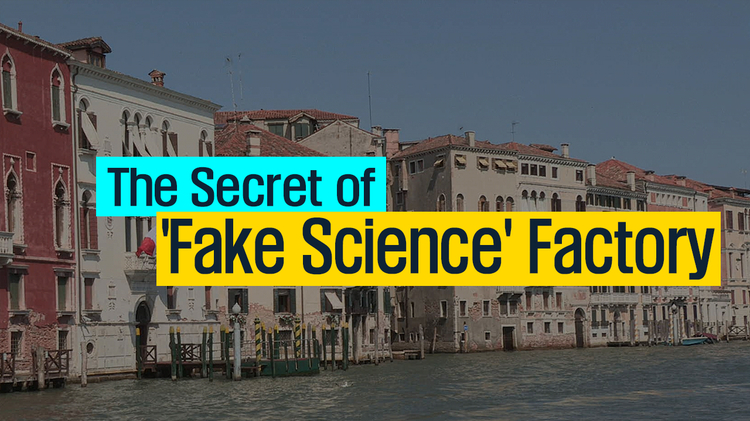
The Secret of 'Fake Science' Factory
2018년 09월 11일 18시 51분
**Click ‘CC’ button for English subtitles**
The government investigation found that more than 1,300 Korean researchers have been participating in the so-called ‘fake conferences’ hosted by World Academy of Science, Engineering and Technology(WASET) and OMICS Publishing Group.
This is a result of the government’s two-month official investigation, which was launched just after the exposé in July by Korea Center for Investigative Journalism(KCIJ)-Newstapa and its 22 media partners across the world.
On Sept. 12, Ministry of Science and ICT and Ministry of Education announced the results of its total inspection on Korean scholars’ use of international fake academic publishers and the following measures. The inspection was taken on 238 four-year universities nationwide, 26 state-run research institutions, and four public research universities -- including KAIST, DGIST, GIST and UNIST.
According to the inspection, a total of 1,317 professors and researchers affiliated with Korean institutions were found to have attended bogus conferences hosted by WASET and OMICS from 2014 to end of August this year. Of 1,317 researchers, 180 turned out to have attended such a conference twice or more and 46 did so for three times or more.

By university, Korea’s most prestigious public and private universities were ranked within the top 10 list by number of attending a fake conference. Similar with Newstapa analysis, Seoul National University topped the rank as its staffs attended WASET and OMICS conferences 97 times in the recent five years, followed by Yonsei University (91 times), Kyungpook National University (78 times), Chonbuk National University (65 times), Pusan National University (62 times) and ChungAng University (52 times).
The government stressed that “the action of intentionally and repetitively participating in fake conferences is likely to have been used to waste state R&D funds and generating unethical research results” in a statement. Extensive investigations and follow-up sanctions will be imposed on the participants by end of the year, the statement wrote.
Each university and research institutions are subjected to voluntarily hold follow-up investigations on their staffs to verify if they attended the fake conferences in an intention of misusing government R&D grants or carrying out misconducts during the trips.
Those researchers who are found to be problematic will be penalized. Professors or researchers who are assigned with high-level position will face heavier penalty such as dismissal. Individual scholars and institutions that are found with misuses will be subjected to reimburse the state R&D funding they already spent.
The government is considering to ban an institution, which tend to be hesitant in conducting investigations or soft in imposing penalty, from participating in state R&D projects.
Universities already clawed back some of their staffs’ spending from state R&D projects, for abusing the taxpayers’ money in bogus conferences.
Han Seung-hoon, professor at Chonnam National University who have gone to 10 overseas business trips to international conferences in the recent five years, was found to have spent more than 50 million won (USD 49,000) in state R&D funding. The university clawed back parts of the amount for a couple of recent trips after Newstapa exposed that Han misused the opportunity.
Korean Sciences Promotion Act bans professors and researchers who are found of misusing state R&D funding from receiving future state financial assistances for up to 5 years. This is why universities and research institutions have to crack down such cases by conducting in-depth inspection on the R&D funding.
After KCIJ-Newstapa shed light on the fake conference issue, the Korean government conducted an extensive inspections and announced a series of follow-up measures on scholars who are suspected of using the fake publishers towards their research achievements.
It was the first time in Korea that the government and local academic circle publicly discussed this issue and potential impacts it may generate. However, there certainly are limitations.
The government limited the investigation to be on data generated within recent five years, from 2014 to present. It announced that Koreans have attended WASET conferences 1,137 times during the same period. However, according to KCIJ-Newstapa’s data analysis on WASET website, scholars from Korean institutions submitted a total of 4,227 full papers and abstracts from 2007 to June 2018.
Due to the difference, some universities that were ranked in Newstapa’s top 10 institutions list were left out from the government’s list. Sungkyunkwan University, which was ranked at the 2nd from Newstapa’s list with 98 papers and abstracts; Hanyang University, ranked at the 7th with 56 papers and abstracts; and Korea University, ranked at the 10th with 49 papers and abstracts, were all excluded from the government’s top 10 list.
The Science Ministry explained that it had to limit the investigation subjects to documents within five years, due to current regulation.
The government must extend the investigation subjects to academic articles and trips from older than five years, and conduct more extensive inspection on state R&D funds that supported trips to the fake conferences.
As there’s only three months left until the deadline the government claimed to meet, KCIJ-Newstapa will continue investigating on how its follow-up measures are carried through.
뉴스타파는 권력과 자본의 간섭을 받지 않고 진실만을 보도하기 위해, 광고나 협찬 없이 오직 후원회원들의 회비로만 제작됩니다. 월 1만원 후원으로 더 나은 세상을 만들어주세요.